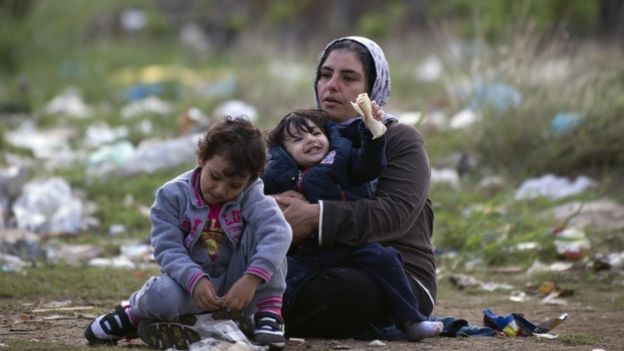Migrant crisis: EU splits exposed as summit looms


Splits within the EU on the relocation of 120,000 migrants have been further exposed as leaders gather for an emergency meeting in Brussels.
Slovakia is launching a legal challenge to mandatory quotas that were passed in a majority vote on Tuesday.
Hungary's PM defended its "democratic rights" and proposed a radical budgetary revamp to raise funds.
The summit will focus on tightening EU borders and aiding neighbours of Syria, from where many migrants come.
Migrant crisis: Latest updates
EU leaders have struggled to find a co-ordinated response to the crisis.
British Prime Minster David Cameron and French President Francois Hollande held talks on the eve of the meeting, saying that finding a solution to the Syrian conflict would be key to resolving the migrant crisis.
They also agreed more should be done to return migrants who do not have a genuine claim for asylum, a Downing Street spokesman said.
The UK has opted against taking part in the relocation scheme and has its own plan to resettle migrants directly from Syrian refugee camps.
Ahead of the summit on Wednesday, the European Commission set out proposals for managing the refugee crisis. They include:
1. Rolling out support teams to migrant hotspots
2. Restoring free movement in the Schengen zone, where a number of members have recently introduced border controls
3. The issuing of warnings to 19 member states for failing to follow asylum procedures
4. A proposal of an additional €1.7bn ($1.9bn; £1.24bn) in funds to tackle the crisis — €1bn would go to help Turkey, the rest to aid agencies and asylum, police and border organisations
The scale of the problem was highlighted again on Wednesday when Croatia revealed that 44,000 migrants — including 8,750 on Tuesday — had arrived there since Hungary completed a fence along its border with Serbia last week.
Analysis: Chris Morris, BBC Europe correspondent
European Council President Donald Tusk has told EU leaders that this summit should focus on policies they can implement to help each other, rather than a long list of issues to use to blame each other.
It is both an appeal for practical progress, and an acknowledgement that the political atmosphere has become pretty toxic.
Several leaders will arrive in Brussels angry that their governments have been outvoted on the issue of relocating tens of thousands of refugees. But Mr Tusk will be keen to avoid recrimination.
Instead he wants to focus on improving the security of the EU's external borders, and ensuring that failed asylum seekers get sent home more efficiently.
Most of all though there will be emphasis on increasing funding for UN agencies that deal with refugees in countries bordering Syria, and on closer co-operation with, and more assistance for, Turkey. It is housing more than 2m Syrian refugees, and has become the main gateway into Europe.
In a rare move for an issue involving national sovereignty, EU interior ministers approved the resettlement scheme by majority vote rather than unanimous approval.
EU Migration and Home Affairs Commissioner Dimitris Avramopoulos denied this was harmful to the EU, saying: "On the contrary, it is a victory for the EU and for all member states."
The deal will see thousands of migrants moved from Italy and Greece to other EU countries. A proposal to take 54,000 migrants from Hungary was dropped.
Finland abstained from the vote. Poland, which had originally opposed the proposal, voted for it. But the plan's opponents have lashed out.
On Wednesday, Slovakia announced a legal challenge — PM Robert Fico said a charge would be filed at the European Court of Justice, adding that Slovakia would not implement the rule
Hungarian PM Viktor Orban insisted his country had a "democratic right" to a different approach and rejected what he called German Chancellor Angela Merkel's "moral imperialism"
Czech President Milos Zeman said on Tuesday that "only the future will show what a mistake this was"
However, Czech PM Bohuslav Sobotka said on Wednesday it would not launch a court challenge, adding: "Europe must not fall apart on the migration crisis."

Romania said it could manage its allocation but President Klaus Iohannis insisted mandatory quotas were not the answer.
The UN has warned that the relocation alone would not be enough to stabilise the situation.
Close to 480,000 migrants have arrived in Europe by sea this year, and are now reaching European shores at a rate of nearly 6,000 a day.
Политика конфиденциальности | Правила пользования сайтом







